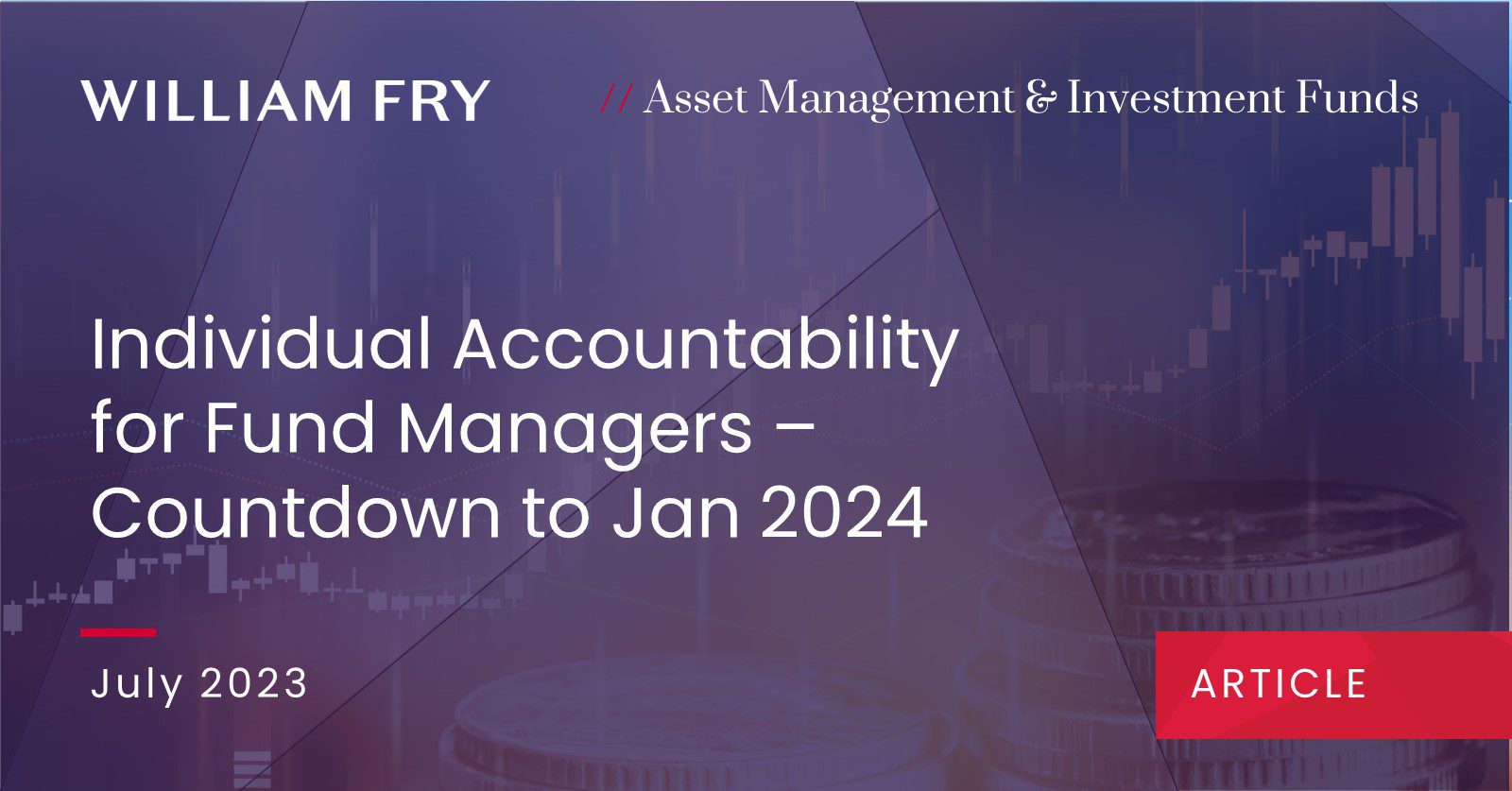The introduction of an individual accountability framework (IAF) has been a key agenda item for the Central Bank since 2018, when it was recommended to address behaviour and cultural issues identified during a regulatory review of Irish retail banks.
Following the removal of the so-called participation hurdle by legislation signed into law on 9 March 2023 (the IAF Act), the Central Bank moved swiftly to publish its first consultation on the IAF Framework (CP153) on 13 March 2023. The consultation closed on 13 June 2023 and feedback is awaited.
On 21 April 2023, further implementation steps were taken with the publication of updated Central Bank regulations and guidance for F&P investigations, suspensions and prohibitions (the updated F&P procedures). The updated F&P procedures amend and replace the previous version and set out the Central Bank’s approach to investigating controlled function (CF) role holders, including former CFs (for a period of up to 6 years following departure from the role subject to a back-stop date of 19 April 2023). Our briefing on the updated F&P procedures is available here.
A further consultation (CP154) was published by the Central Bank on 22 June 2023, this time dealing with reforms to the Central Bank’s Administrative Sanctions Procedure which will underpin and support the IAF framework. The consultation is open until 14 September 2023 and our briefing on this development is available here.
What is the IAF framework?
As the name suggests, the IAF seeks to hold individuals accountable for their responsibilities in regulated firms. The framework includes:
- a senior executive accountability regime (SEAR) for banks, insurers and certain MiFID firms;
- conduct standards for individuals in all regulated firms and firms themselves;
- enhancements to the Fitness & Probity (F&P) regime; and
- enhanced Central Bank powers of enforcement to ensure individuals’ and firms’ compliance.
What’s the timeline for introduction of the IAF?
20 April 2023: updated F&P investigation regulations and guidance published
13 June 2023: CP153 closed to comment
22 June 2023: CP154 published for comment
Q4 2023: Updated Business standards to be published as part of the Central Bank’s separate review and consultation on the update of the Consumer Protection Code (CPC)
31 December 2023: F&P enhancements and conduct standards to enter into effect
1 July 2024: SEAR to take effect for certain firms
Pillar 1: SEAR – Effective 1 July 2024
The IAF imposes an enforceable legal duty on pre-approval controlled function (PCF) holders to take reasonable steps to avoid a firm breaching those legal obligations relating to activities for which the PCF is responsible. The consultation includes draft rules for the scope of this legal duty, PCF responsibilities and firms’ documentation of those responsibilities along with draft regulatory guidance for assessing ‘reasonable steps’ and complying with the draft rules.
Are fund management companies in scope of SEAR?
Initially, SEAR will only apply to banks, insurers and MiFID firms carrying out bank-like activities. Fund managers are therefore, not in scope of SEAR. However, the Central Bank confirms, as per previous indications, that it intends to extend SEAR’s application once lessons have been learned from the first wave. As this briefing is for fund managers it does not focus on SEAR however, further details of this pillar of the IAF can be found on our dedicated IAF & SEAR site.
Conduct Standards – Effective 31 December 2023
The IAF imposes an enforceable legal duty on CF holders to take reasonable steps (further details below) to meet the conduct standards and requires regulatory reporting by firms of CF disciplinary action relating to breaches of those standards.
Common conduct standards for all CFs, including PCFs
The common conduct standards apply to all CF holders in any regulated firm including NEDs, INEDs and those exempt from the F&P regime e.g., outsourced CF roles and intra-group arrangements.
The IAF includes detailed guidance on the regulatory expectations for compliance with each of the common conduct standards (see Chapter 5 of the draft guidance under consultation) of acting with honesty and integrity; acting with due, skill, care and diligence; cooperating in good faith and without delay with regulators; acting in the best interests of customers and treating them fairly and professionally; and operating in compliance with standards of market conduct and trading venue rules.
Additional conduct standards for PCFs and CF1s
The additional conduct standards apply to PCFs and CF1s in any regulated firm, including temporary PCF appointments. However, unlike the common standards, the additional standards do not apply to those PCF roles which are exempt from pre-approval under the F&P outsourcing exemption, unless of course the holder is also a CF1.
The IAF includes detailed guidance on the regulatory expectations for compliance with each of the additional conduct standards (see Chapter 6 of the draft guidance under consultation) of ensuring that the firm’s business is controlled effectively, is conducted in accordance with applicable legislation, that delegated tasks are assigned to an appropriate person with effective oversight and that any information that the Central Bank would reasonably expect notice of is disclosed promptly and appropriately.
Firms’ obligation to embed conduct standards
Firms are obliged to:
- Notify CFs of the common and additional conduct standards, as appropriate, and make a record of such notifications.
- Establish and maintain policies for the integration of the standards into the conduct and culture of the firm e.g., as part of performance and promotion reviews, and ensure they are kept under review and subject to senior management oversight and challenge.
- Adopt a framework to identify, monitor and action potential breaches of the conduct standards and report to the Central Bank on formal disciplinary actions (formal warning, suspension, dismissal, pay reduction) for actual breaches of these standards.
- Establish a training programme, subject to senior management oversight and challenge, for the provision of initial (post-IAF implementation), pre-appointment and ongoing CF training on the conduct standards so that role holders are aware of their obligations vis-à-vis the standards and what is expected of them in their role.
What are reasonable steps in the context of SEAR and the conduct standards?
In the case of both SEAR and the conduct standards, the IAF operates a ‘reasonable steps’ principle i.e., if these have been taken to achieve an outcome, that will be sufficient to discharge the relevant obligation.
In assessing the steps that an individual took in any given circumstance, the Central Bank will consider what steps an individual could reasonably have been expected to take in that position and at that point in time.
F&P Enhancements – Effective 31 December 2023
- Additional CF certification process
Currently, firms must satisfy themselves of CF holders initial and ongoing compliance with the F&P standards and must obtain CF holders agreement to abide by those standards. The IAF introduces an additional step for firms of issuing a certificate of compliance in respect of each CF.The form of certification is a matter for individual firms however, it must document (i) the firm’s satisfaction as to the CF’s compliance with the F&P standards and the steps taken to be satisfied, (ii) the CF’s agreement to abide by the standards, (iii) the relevant CF role(s) held, (iv) an outline of the parts of the business in which the CF will be involved and (v) whether the role(s) is outsourced to an unregulated entity (in which case the firm retains responsibility for F&P compliance). One individual should be assigned overall responsibility for CF certification which, in the case of non-SEAR firms, should be the CEO or equivalent.Firms must certify CF holders (including PCF holders) pre-appointment, annually and in advance of any appointment to a new CF role. For new firms, CF certificates must issue within 5 days of authorisation and existing firms will have a two-month transition period (from the date of implementation of the IAF) in which to certify current CFs, where a single certificate will be sufficient for those with multiple CF roles.
Firms’ CF certificates are not required to be filed with the Central Bank, however the existing CF register should be updated to reflect certification and the register is required to be available, on request, to the Central Bank. The Central Bank’s annual PCF return will be extended to include confirmation of the certification of CFs, including PCFs, and a firm must report to the Central Bank if it revokes or does not renew a certificate or on any formal CF disciplinary action relevant to F&P compliance.
- Additional CF due diligence
Currently, PCF and CF1 and CF2 holders are subject to additional levels of due diligence under the F&P regime. The IAF applies this higher level of due diligence to all CFs meaning that, instead of relying on self-certification, firms are expected to carry out regulatory sanctions checks, director restriction/disqualification checks, and judgement searches as well as carrying out professional body checks and any other role/firm-specific checks on all CFs. - Holding companies now in scope
The F&P regime is to be extended to include holding companies established in Ireland and CF holders in those companies.
Next steps
Following publication of the IAF Act, Central Bank IAF consultations, and updated F&P procedures, fund managers should progress compliance plans and work programmes taking account of the proposed timeline for implementation of the IAF set out above.
Contact Us
If you have any queries on the issues discussed in this article, please get in touch with the key contacts, any member of the Asset Management & Investment Funds team or your usual William Fry contact.




